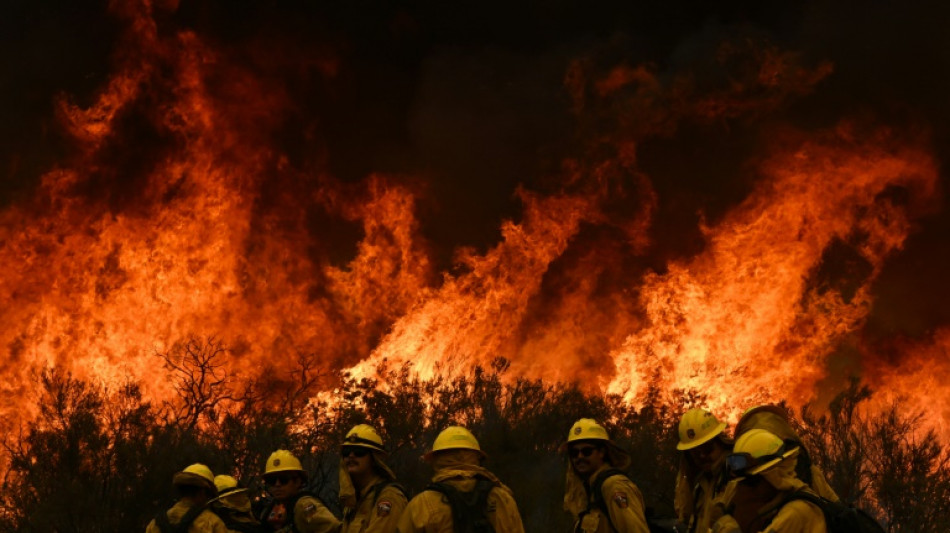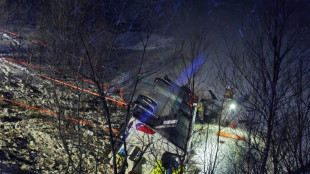
| RBGPF | 100% | 59.84 | $ | |
| CMSD | -0.67% | 23.32 | $ | |
| SCS | 0.58% | 11.97 | $ | |
| RELX | -0.61% | 45.58 | $ | |
| BTI | -0.33% | 36.31 | $ | |
| GSK | -0.12% | 34.08 | $ | |
| RIO | -0.41% | 59.01 | $ | |
| BCC | -1.91% | 120.63 | $ | |
| NGG | 0.66% | 59.31 | $ | |
| CMSC | -0.85% | 23.46 | $ | |
| BP | 0.38% | 28.96 | $ | |
| BCE | -0.93% | 22.66 | $ | |
| VOD | 0.12% | 8.43 | $ | |
| AZN | -0.39% | 66.26 | $ | |
| JRI | -0.41% | 12.15 | $ | |
| RYCEF | 0.14% | 7.27 | $ |

Oregon blaze latest major wildfire to engulf US West
A massive wildfire burned out of control Monday in Oregon forcing residents to flee and threatening towns and thousands of homes, in the latest blaze to scorch the US West during a blistering summer.
Dozens of active infernos in California, Idaho, Oregon, Washington and other western states have ravaged more than 1,200 square miles (3,100 square kilometers), worsening air quality and highlighting the devastating effects of a historic two-decade-plus drought that has left the region parched.
The Cedar Creek fire east of the city of Eugene, Oregon experienced "extreme" growth over the weekend and has now consumed 86,734 acres (35,100 hectares) -- roughly twice the size of the US capital Washington -- with zero percent containment as of Monday, according to the National Wildfire Coordinating Group (NWCG).
More than 1,200 firefighters and other personnel have converged on the steep mountainous terrain, much of it in US national forest land and hard to reach.
"They have been constructing firelines away from the active fire edge, along roads and trails, where they have a better chance of successfully stopping the fire," NWCG reported.
Evacuations were ordered for Lane and Deschutes counties, and the Deschutes and Willamette national forests have been closed. More than 2,000 homes were under threat, authorities said.
Dense smoke has enveloped the region, and according to NWCG, "smoke has created unhealthy air quality for communities east of the fire as well, including Bend," a town that serves as a gateway for outdoor tourism.
"Get out of here as fast as I can," Herman Schimmel, who moved to the small town of Westfir only recently, told The Oregonian newspaper. "That's all I was thinking about."
Local media reported that cooler and calmer weather had improved conditions somewhat later on Monday, with officials easing evacuation instructions in some areas.
The western United States is more than two decades into a historic drought that scientists say is being worsened by human-made climate change.
Much of the countryside is parched, creating conditions for hot, fast and destructive wildfires.
- Homes threatened -
An even larger blaze was burning in northwestern Oregon Monday, in a more remote region. The Double Creek fire, first detected on August 30, has consumed 155,000 acres and was 15 percent contained.
According to the National Interagency Fire Center (NIFC), more than 90 fires were currently burning across seven states in the West: California, Idaho, Montana, Oregon, Utah, Washington and Wyoming.
More than 1,200 square miles in total was burning -- an area larger that Yosemite National Park -- NIFC reported Sunday.
The Mosquito Fire, California's current largest blaze, has now swept through 46,500 acres in the Sierra Nevada Mountains, with several small nearby towns reportedly evacuated.
The official CalFire website said that while cooler temperatures -- following more than a week of blistering heat -- had somewhat slowed the fire's progress, stronger winds were pushing it to the north and northeast, threatening hundreds of homes.
Meanwhile, firefighters were working to contain the major Fairview fire, south of Los Angeles, which has claimed two lives.
Firefighters have the blaze 53 percent under control, local media reported Monday, raising hopes it may be slowing down after rainfall and lower temperatures at the weekend.
Air quality alerts have been issued in Oregon, Washington and Idaho due to smoke from the blazes.
D.Gismondi--LDdC



